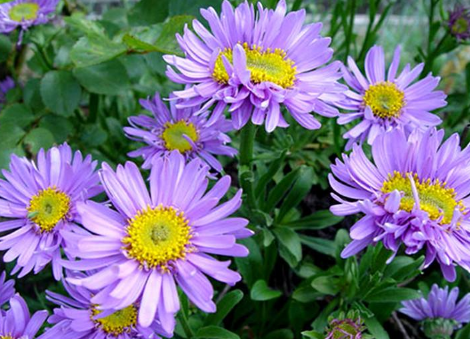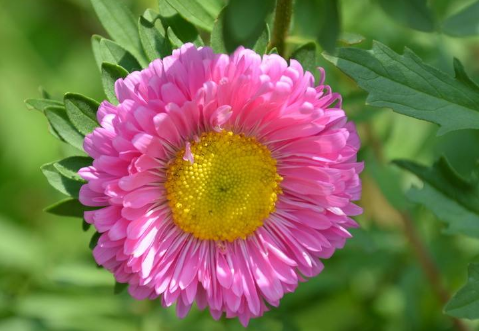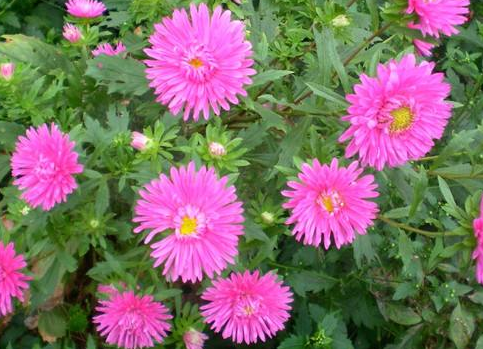Sowing method of Cui Chrysanthemum
1. The seeds of green chrysanthemum are relatively large. We should insert the tip of the seed into the soil one by one. Note that Cuiju is a shallow-rooted plant, not too deep.

two。 Keep the temperature about 20 ℃, the soil is moist and fertile, and seedlings can grow after a week of sowing.
3. Seedlings grow to 10 cm can be planted, high temperature in summer, pay attention to appropriate amount of watering.
Planting methods of green chrysanthemum
Cuiju is rich in color, changeable in shape and bright in color. It is one of the most important flowers in the courtyard, so it has a broad planting base. Do you know how to grow chrysanthemum? The key points of this article
Cuiju
Mode of reproduction
Cuiju is propagated by seeds, and strip sowing is easy to emerge seedlings. Under the condition of 14-16C
It sprouted in 4 days and emerged in about 10 days. Generally, it can be sown in spring, summer and autumn, and it can blossom in 2-3 months after sowing. The florescence can be controlled by sowing in batches as needed. The dwarf species can blossom from May to June after sowing in the greenhouse from February to March or in the sunny border in March, from April to May when sowing in the open field from July to August, sowing in early July and flowering in the "National Day" in the first ten days of July, and sowing in the first and middle of August. The seedlings overwintered in a cold bed and flowered on May Day the following year. The medium-sized varieties were sown from May to June, flowered from August to September, sowed in a cold bed in August, and flowered from May to June the following year. Tall varieties can be sown in spring and summer, and all blossom in autumn, but it is suitable to sow in early summer.
Cultivation techniques
Cui Chrysanthemum seedlings transplanted 2-3 times, can make the stem thick, full-shaped, dense fibrous roots, drought, flood and lodging resistance. The seedlings of spring sowing grow up to 5-lOcm, can be moved about one month after sowing, and are planted about two months after sowing. During seedling raising, irrigate 2-3 times and loosen the soil once. Irrigate 2-3 times after planting, then loosen the soil, loosen the soil after rain. Topdressing irrigation is generally carried out after planting and before flowering. Should pay attention to ploughing to preserve soil moisture, in order to avoid too much watering or Rain Water too much and the soil is too wet, plant overgrowth, lodging or disease. When the bud appeared at the end of the branch, it should be watered less to inhibit the elongation of the main branch and promote the growth of the lateral branch. when the lateral branch reached 2-3cm, the water content should be slightly increased to make the plant type plump. Topdressing is mainly phosphorus and potash fertilizer. Do not continuous cropping, and it is not suitable to sow or plant seedlings in the land where other Compositae plants have been planted to ensure their robust growth.
Pest control
Chlorosis
Harmful symptoms: chlorosis of Cuiju is an important disease of Cuiju, and the diseased plant is short.
Green chrysanthemum yellow flower disease
, atrophy, small flowers, discoloration. After infection, the leaves are yellowish and often grow broom-like branches from the beginning to the end. the flowers on the branches fade in varying degrees, and the petals are usually yellowish green. The growth of the plant is weak and can continue to infect neighboring plants. [3]
Prevention and control methods:
1. The best control method is to put the plant species in the net room.
2. 50% marathon 1000 times liquid or diazinon and other pesticides can be sprayed to control leafhoppers.
3. The wild weeds around Cuiju should be removed frequently to reduce the source of infection.
4. in the early stage of the disease, 4000 times of medical tetracycline or oxytetracycline was sprayed.
Matters needing attention
Green chrysanthemum is a kind of very ornamental flower plants, which is not only used for garden cultivation, but also as a potted plant, but also an important cut flower material.
Planting methods of Cuiju growth habits of Cuiju
Cuiju, also known as Jiangxila, July chrysanthemum, Gesang flower, etc., is an annual or biennial herb of the genus Compositae. It grows in Jilin, Liaoning, Hebei, Shanxi, Shandong, Yunnan, Sichuan and other places. It grows on hillsides, grasses, watersides or shady places of sparse forests. It is usually used for ornamental planting in botanical gardens, gardens, courtyards and other public places. Let's take a look at the planting method of Cuiju.
Growth habits of Cuiju
Cuiju is a shallow root plant, pay attention to water supply in dry season. The plant is robust and does not choose soil, but it likes fertilizer and grows better in fertile sandy soil. Like sunshine, like moisture, not resistant to waterlogging, high temperature and humidity are vulnerable to diseases and insect pests. The heat resistance and cold resistance are poor. The high-type varieties have strong adaptability and can be planted anywhere, while the medium-dwarf varieties have poor adaptability and need fine management. Continuous cropping should be avoided and should be planted every 3-4 years. Potted plants should be replaced with new soil once a year.
Propagation methods of Cuiju
The main results are as follows: 1. Cuiju is propagated by seeds, and strip sowing is easy to emerge. Under the condition of 14-16 ℃, it germinated in 4 days and emerged in about 10 days. Generally multi-spring sowing, summer sowing and autumn sowing can blossom 2-3 months after sowing, and the florescence can be controlled by sowing in batches as needed.
2. The dwarf species of Cuiju can blossom after sowing in the greenhouse from February to March or sowing in the sunny border from May to June, from April to May, from July to August, in the first ten days of July, in the first ten days of July, and in the first and middle of August. The seedlings overwintered in a cold bed and flowered on May Day the following year.
3. The medium-sized variety of Chrysanthemum was sown from May to June, flowered from August to September, overwintered in cold bed for sowing in August, and flowered from May to June the following year. Tall varieties can be sown in spring and summer and blossom in autumn.
Planting methods of green chrysanthemum
The main results are as follows: 1. Cuiju seedlings are transplanted for 2 or 3 times, which can make the stem thick, the shape of the stem plump, the fibrous root dense, drought-resistant, flood-resistant and lodging-resistant. Spring sowing seedlings grow up to 5~lO cm, can be moved about a month after sowing, and planted about two months after sowing. During the seedling raising period, irrigate for 2 or 3 times and loosen the soil once. Irrigate for 2 or 3 times after planting, then loosen the soil, loosen the soil after rain. Topdressing irrigation is generally carried out after planting and before flowering.
2. When planting chrysanthemum, we should pay attention to ploughing and preserving soil moisture, so as to avoid excessive watering or Rain Water's excessive watering and soil wetness, plant overgrowth, lodging or disease. When the bud appears at the end of the branch, it should be watered less to inhibit the elongation of the main branch and promote the growth of the lateral branch. when the lateral branch grows to 2-3 cm, it will slightly increase the moisture and make the plant type plump. Topdressing is mainly phosphorus and potash fertilizer. Do not continuous cropping, and it is not suitable to sow or plant seedlings in the land where other Compositae plants have been planted to ensure their robust growth.
Pest control of Chrysanthemum morifolium
1. Chlorosis: the best way to control chlorosis is to put the plant species in the net room, or you can spray 1000 times of 50% marathon or diazinon and other pesticides to control leafhoppers. At the same time, it is necessary to often remove wild weeds around Cuiju to reduce the source of infection, and spray medical tetracycline or oxytetracycline 4000 times at the initial stage of the disease.
2. Botrytis cinerea: Botrytis cinerea overwinters on the remnant or in the soil for the fungi of Botrytis cinerea. It is easy to occur when the temperature is about 20 ℃ and the humidity is very high. The disease in plastic greenhouse is more serious than that in glass greenhouse. We should pay attention to greenhouse ventilation, reduce humidity and avoid inappropriate watering. Timely removal of diseased plants, diseased leaves, reduce the source of infection, spray 50% Sukeling wettable powder 1500 times liquid or 50% prohydantoin 1500 times solution.
3. Fusarium wilt: at the initial stage and before the onset of the disease, root irrigation or spray with 50% carbendazim wettable powder 500 times, 0.25 kg per plant, once every 5 days for 2 times, or 40% carbendazim glue suspension 400 times, or 50% methyl thiophanate wettable powder 400 times solution, or 10% double effect water agent 200 times 300 times, or 25.9% Kangkuning 500 solution The root can also be irrigated with 800-1500 times solution of potassium permanganate.
3. Rust: when there is a transferred host pine plant near Cuiju, it is easy to lead to the occurrence and epidemic of the disease, chlorotic spots appear on the front of the leaves, and a pile of round yellowish powdery spores can be seen on the back. Spraying 15% triadimefon (triadimefon) wettable powder 1500 times or 12.5% Supra 3000 times at the initial stage of the disease.
4. Brown spot: planting in areas with good drainage should be selected, planting density should be appropriate, disease-resistant varieties should be selected, diseased leaves should be removed immediately, diseased leaves and remnants should be collected and destroyed at the end of autumn, and 50% carbendazim wettable powder 1000 times, or 80% Bordeaux solution, or 755 chlorothalonil 500 times solution should be sprayed every 7 days.
- Prev

Sowing time of Cuiju
The sowing time of different varieties of chrysanthemum is also different, and the dwarfs raised by families are generally sown in spring. The dwarf chrysanthemum is suitable for sowing in the greenhouse from February to March or in the sunny bed in March, and can blossom in May-June; sowing in the open field from April to May and from July to August.
- Next

Matters needing attention in the Culture of Cuiju
1. Pruning chrysanthemum generally does not need to pick the heart, generally often trim loose side branches, so that the peanuts on the main branch grow better. two。 Cuiju likes sunshine. Keeping light for 15 hours a day will make the plant grow more vigorous and sturdy. 3. Water the chrysanthemum moderately to keep the basin soil moist.
Related
- Fuxing push coffee new agricultural production and marketing class: lack of small-scale processing plants
- Jujube rice field leisure farm deep ploughing Yilan for five years to create a space for organic food and play
- Nongyu Farm-A trial of organic papaya for brave women with advanced technology
- Four points for attention in the prevention and control of diseases and insect pests of edible fungi
- How to add nutrient solution to Edible Fungi
- Is there any good way to control edible fungus mites?
- Open Inoculation Technology of Edible Fungi
- Is there any clever way to use fertilizer for edible fungus in winter?
- What agents are used to kill the pathogens of edible fungi in the mushroom shed?
- Rapid drying of Edible Fungi

